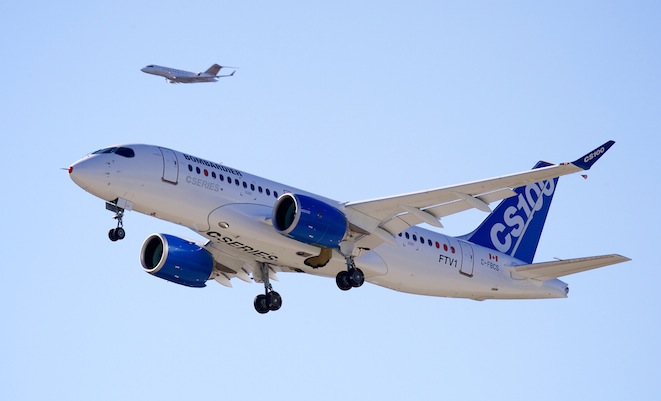
The troubled Bombardier CSeries test program has been halted after a reported uncontained engine failure on its FTV1 lead test and development aircraft on May 29.
A report in the Wall Street Journal on May 30 says the Pratt & Whitney PW1500G engine failed during ground runs, and debris was seen coming out of the engine’s casing and that the aircraft’s airframe had been damaged.
A May 30 company statement confirmed the incident, saying: “Bombardier confirmed that late yesterday there was an engine-related incident during stationary ground maintenance testing involving the CSeries FTV1 aircraft at its facility in Mirabel, Quebec. Bombardier is investigating the incident with the support of Pratt & Whitney and the appropriate authorities. Safety is the priority, and the CSeries aircraft flight test program will resume once the investigation is completed.”
A P&W spokesman Ray Hernandez told Air Transport World on May 30 that the company “is working with Bombardier to understand the incident that occurred on May 29. At this time, it is premature to discuss the incident in detail.”
The engine failure if the latest setback in the CSeries program which has suffered from several development delays which have pushed back its planned service entry by more than two years to late 2015, a blowout in development costs, and a lack of orders from airlines with just 203 logged to date.
The CSeries is planned to be offered in 110 and 130 seat versions as an alternative to the Airbus A318/319, Boeing 737-700/7MAX, Embraer’s E190/195, and the forthcoming Mitsubishi MRJ and Irkut MC-21 regional jets.
The CSeries’ PW1500G engine is a geared turbofan (GTF) engine which has a higher fan diameter and lower fuel consumption than conventional turbofans. Derivatives of the GTF are on offer on Airbus’ A320NEO Family range, and will also be offered on the MRJ, MC-21, and the re-engined E190/195 E2.




